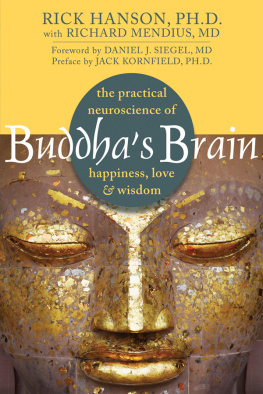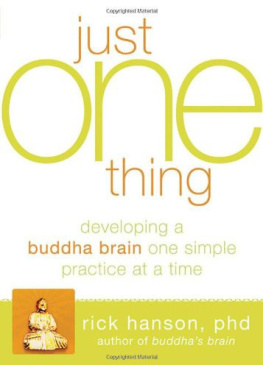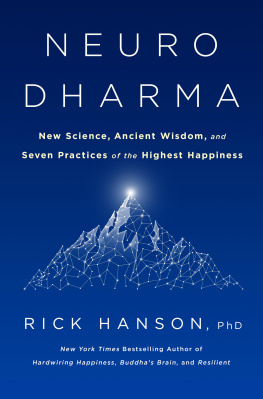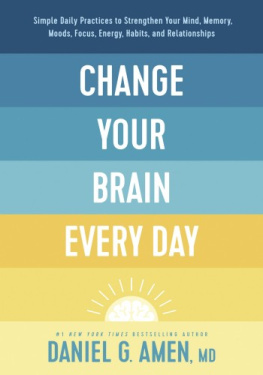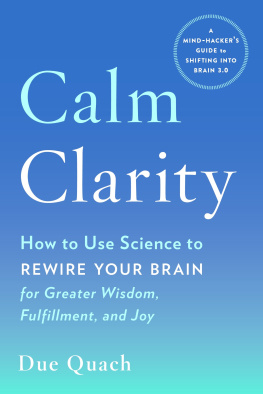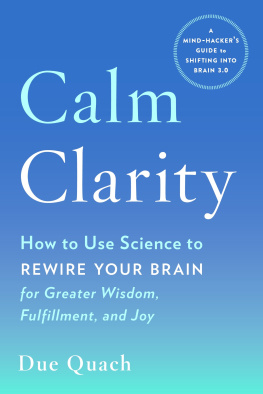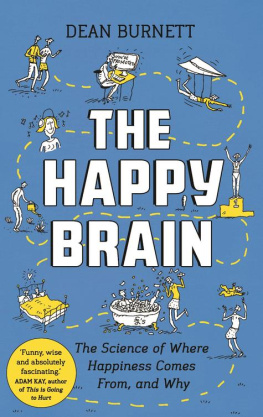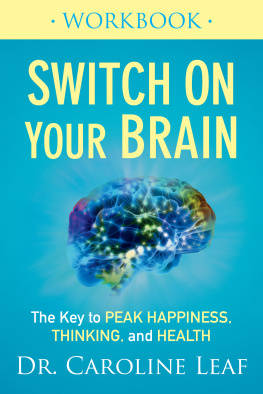Acknowledgements
We would like to thank and acknowledge many people:
Our spiritual teachers, including Christina Feldman, James Baraz, Tara Brach, Ajahn Chah, Ajahn Amaro, Ajahn Sumedho, Ajahn Brahm, Jack Kornfield, Sylvia Boorstein, Guy and Sally Armstrong, Joseph Goldstein, Kamala Masters (special thanks for the chapter on equanimity), Steve Armstrong, Gil Fronsdal, Phillip Moffit, Wes Nisker, and Adi Da.
Our intellectual teachers and mentors, including Dan Siegel, Evan Thompson, Richard Davidson, Mark Leary, Bernard Baars, Wil Cunningham, Phil Zelazo, Antoine Lutz, Alan Wallace, William Waldron, Andy Olendzki, Jerome Engel, Frank Benson, and Fred Luskin; during the final preparation of this book, we came across a paper written by Drs. Davidson and Lutz entitled Buddhas Brain, and we respectfully acknowledge their prior use of that term; we also bow to the memory of Francisco Varela.
Our benefactors, including Spirit Rock Meditation Center, the Mind and Life Institute, Peter Bauman, the members of the San Rafael Meditation Group, Patrick Anderson, Terry Patten, Daniel Ellenberg, Judith Bell, Andy Dreitcer, Michael Hagerty, Julian Isaacs, Stephen Levine, Richard Miller, Deanna Clark, the Community Dharma Leaders Program, and Sue Thoele.
Our careful readers, who made many helpful suggestions, including Linda Graham, Carolyn Pincus, Harold Hedelman, Steve Meyers, Gay Watson, John Casey, Cheryl Wilfong, Jeremy Lent, and John Prendergast.
Our wonderful editors and designers at New Harbinger, including Melissa Kirk, Jess Beebe, Amy Shoup, and Gloria Sturzenacker.
Our painstaking and large-hearted illustrator, Brad Reynolds (www.integralartandstudies.com).
Our families, including Jan, Forrest, and Laurel Hanson; Shelly Scammell; Courtney, Taryn, and Ian Mendius; William Hanson; Lynne and Jim Bramlett; Keith and Jenny Hanson; Patricia Winter Mendius, Catherine M. Graber, E. Louise Mendius, and Karen M. Chooljian.
And the many other people who have opened the mind and heart of each of us.
Appendix
Nutritional
Neurochemistry
Jan Hanson, L.Ac.
The previous chapters have explored how to influence the brain through mental interventions. This appendix will summarize ways to support brain function through the physical intervention of skillful nutrition. Of course, none of these suggestions are a substitute for professional care, nor are they aimed at treating any medical condition.
As an acupuncturist who has focused on clinical nutrition for many yearsand needed to apply some of its lessons to herself!Ive repeatedly seen that small, thoughtful, sensible changes in what you put into your mouth each day can gradually produce significant benefits. And sometimes these stepssuch as taking nutrients youve needed for a long timecan lead to rapid improvements in your well-being.
Diet Basics
Help your brain by eating well every day, minimizing your sugar intake, and avoiding food allergens.
Eat Well Every Day
Take in a wide variety of rich nutrients. More than anything, this means eating lots of protein and vegetables. Eat protein at every meal; aim for a portion roughly the size of your palm. Eat at least three cups of vegetables a daymore is better! Ideally, half of your plate at each meal will be covered by vegetables of all kinds and colors. Fruits also provide important nutrition; berries in particular are known to be good for your brain (Galli et al. 2006; Joseph et al. 2003).
Minimize Sugar
Keep your sugar under control. High blood sugar wears on the hippocampus (Wu et al. 2008). Impaired glucose tolerancea sign of eating too much sugaris linked to relative cognitive impairment in older adults (Messier and Gagnon 2000). The best way to minimize sugar is to avoid refined sugar altogether (especially in sugary drinks) as well as foods made from refined flour (e.g., bread, noodles, cookies).
Avoid Food Allergens
Eating foods to which you are sensitive will cause an allergic and inflammatory reaction throughout your body, not just in your digestive system. Chronic inflammation, even if relatively mild, is an enemy of the brain. For example, gluten sensitivities have been linked to a variety of neurological disorders (Hadjivassiliou, Gunwale, and Davies-Jones 2002; Hadjivassiliou et al. 1996). Even without a known sensitivity, increased consumption of milk correlates with an increased risk of Parkinsons disease (Park et al. 2005).
The most common food allergens are products made from cow milk, gluten grains (wheat, oats, rye, barley, spelt, and kamut), and soy. Food allergies can be formally identified through blood tests done by a medical lab. Informally, try eliminating foods you suspect may be problematic for a week or two, and then notice if you feel better, think more clearly, digest more easily, and have more energy.
Fundamental Supplements for Your Brain
Vitamins and minerals are cofactors in thousands of metabolic processes. They support every aspect of your health, including the functioning of your brain and mind (Kaplan et al. 2007). So its important to get enough of these to take care of all of your needs. Unless you spend a lot of time acquiring and preparing fresh foods, you probably arent getting optimal quantities of vitamins and minerals through your diet alone. Therefore, it makes sense to supplement them prudently.
Take a High Potency Multivitamin/Multimineral Supplement
A good multivitamin/multimineral supplement is your insurance policy; it will help you get a wide variety of essential nutrients. While all nutrients are important, put a special focus on the B vitamins, which are particularly vital for brain health. Vitamins B-12, B-6, and folic acid all help a biochemical process called methylation, which plays a crucial role in the production of many neurotransmitters. When you are deficient in these B vitamins, your homocysteine (an amino acid) level may become elevated. Low B vitamins and high homocysteine are risk factors for cognitive decline and dementia in older people (Clarke et al. 2007; Vogiatzoglou et al. 2008). Low folic acid is also a risk factor for depression; supplementing it can relieve depressive symptoms (A. Miller 2008).
Your multivitamin supplement should contain 10 25 times the daily value of all of the B vitamins, and 800 mcg or more of folic acid (Marz 1999). It should have most minerals at 100 percent or more of the daily value. To consume these levels, you may need to augment your general multi with additional supplements.
Take Omega-3 Fatty Acids
The omega-3 fatty acids found in fish oildocosahexaenoic acid (DHA) and eicosapentaenoic acid (EPA)provide many benefits to your brain; these include promotion of neuronal growth, mood elevation, and slowing of dementia (Ma et al. 2007; Puri 2006; Singh 2005; Su et al. 2003). DHA is the predominant structural fatty acid in the central nervous system, and its availability is crucial for brain development. EPA is an important anti-inflammatory molecule.
Take enough fish oil to consume at least 500 milligrams of DHA daily, and about the same amount of EPA (Hyman 2009). Look for a high-quality sourceone that is molecularly distilled; most people prefer capsules to taking fish oil directly.
Or, if youre a vegetarian, take a full tablespoon of flax seed oil daily (perhaps in salad dressing, but dont cook with it). Although flax seed oil converts into DHA and EPA, in most people this conversion is inefficient and incomplete. Consequently, add 500 mg of DHA from algae to your flax seed oil.
Take Vitamin E as Gamma-Tocopherol
Vitamin E is the main antioxidant in the cellular membranes within your brain (Kidd 2005). The most common form of vitamin E consumed through the diet is gamma-tocopherol, which makes up 70 percent of total vitamin-E intake.
Unfortunately, nutritional supplements usually contain alpha-tocopherol, another form of vitamin E. Alpha-tocopherol seems to be less beneficial than gamma-tocopherol, and it dilutes the gamma-tocopherol you naturally get from your diet. This may be one reason why studies of vitamin-E supplementation have produced mixed results. However, one study found that older people who consumed higher levels of vitamin Eprimarily in the form of gamma-tocopherolhad less risk of developing Alzheimers disease and slower rates of cognitive decline (Morris et al. 2005).
Next page
